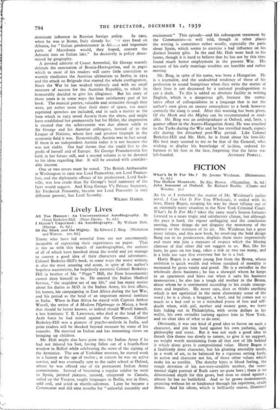Lively Lives
All Too Human : An Unconventional Autobiography. By Owen Berkeley-Hill. (Peter Davies. 8s. 6d.) I Haven't Unpacked : An Autobiography. By William Holt. (Harrap. 8s. 6d.)
THOSE who have led eventful lives are not uncommonly incapable of expressing their experiences on paper. That is not so with this bunch of autobiographies, the authors of all of which have knocked about the world and yet manage to convey a good idea of their characters and adventures. Colonel Berkeley-Hill's book, in some ways the worst written, is also the most amusing and acute, in spite of the author's hopeless eccentricity, for hopelessly eccentric Colonel Berkeley- Hill (a brother of Mr. " Piggy " Hill, the Eton housemaster) cannot deny himself to be. He entered the Indian Medical Service, " the stupidest act of my life," and has many stories about his duties as M.O. in the Indian Army, his love affairs, his horses, his campaigning in East Africa during the last War, and his period as the head of an important mental institute in India. When in East Africa he stayed with Captain Arthur Wavell, the writer of A Modern Pilgrimage to Mecca, a book that should be better known, as indeed should Wavell himself, a less histrionic T. E. Lawrence, who died at the head of the Arab force he had raised against the Germans. Colonel Berkeley-Hill was a pioneer of psycho-analysis in India, and prim readers will be shocked beyond measure by some of his remarks. He married an Indian and has interesting views on bringing up children.
Mr. Holt might also have gone into the Indian Army if he had not injured his foot, having fallen out of a fourth-floor window in Balliol while celebrating the news of the signing of the Armistice. The son of Yorkshire weavers, he started work in a factory at the age of twelve ; at sixteen he was on active service, and was eventually sent to the cadet school at Oxford, where he was offered one of six permanent Indian Army commissions. Instead of becoming a regular soldier he went to Spain, painted pictures, tutored, emigrated to Canada, sailed up the Yangtse, taught languages in Berlin, was in films, sold coal, and acted as shuttle-salesman. Later he became a Communist and did nine months for "unlawful assembly and
encitement." This episode—and his subsequent treatment by the Communists—is well told, though in other places the writing is sometimes rather woolly, especially the parts about Spain, which seems to exercise a bad influence on his distinct literary gifts. In the end Mr. Holt went back to his looms, though it is hard to believe that he has not by this time found much better employment in the present War. His account of his early marriage troubles are horrible and rather moving.
Mr. Bing, in spite of his name, was born a Hungarian. He is a journalist, and the undoubted tendency of those of his profession to sound bumptious when they write the stories of their lives is not decreased by a national predisposition to cut a dash. To this is added an absolute facility in writing English, which is a dangerous gift, because the cumu- lative effect of colloquialisms in a language that is not the author's own gives an uneasy atmosphere to a book however correctly the slang is used. After this warning has been given, Of the Meek and the Mighty can be recommended as read- able. Mr. Bing was an undergraduate at Oxford, and, later, a gunner officer in the Austro-Hungarian Army. He was attached to the Turks during the War and he has travelled much, especi- ally during the disturbed post-War period. Like Colonel Berkeley-Hill and Mr. Holt, he is frank about his love-life. His best story seemed to me to be that of the General, who. wishing to display his knowledge of ju-jitsu, ordered his batman to hit him in the face, forgetting that the latter was












































 Previous page
Previous page